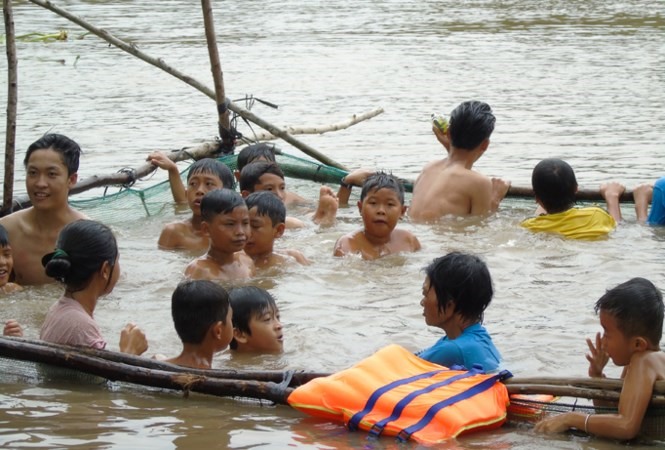

A woman from the Mekong Delta became very upset every time she heard of children drowning when there were floods. So, Sáu Thia decided to start teaching children how to swim.
 |
| Trần Thị Kim Thia (in blue) teaches children how to swim in her training pool. — Photo tienphong.vn |
A woman from the Mekong Delta became very upset every time she heard of children drowning when there were floods.
So, Sáu Thia decided to start teaching children how to swim.
She made a special training pool on the edge of a river and gave lessons to groups of children for fifteen days each.
She made sure they could swim a distance of fifteen metres because that is how far they would have to swim to reach the side of a canal if they fell out of a boat.
ĐỒNG THÁP – After seeing parents grieving the deaths of children who drown every year during the flood season, a resident of the Mekong Delta province of Đồng Tháp Province decided to volunteer as a swimming coach.
Trần Thị Kim Thia, 59, known as Sáu Thia lives in hamlet 4, Hưng Thạnh Commune in Tháp Mười District. “Whenever I see on television news on kids drowning and their parents’ grief, my heart writhes in pain,” Sáu Thia told the Tiền Phong (Vanguard) newspaper.
“In my hometown, when the flooding season came, everywhere was submerged. So when the commune needed a swimming trainer, I volunteered," Sáu Thia said.
In 2002, the commune launched a project to teach children how to swim. “I did not hesitate to take the job but I felt very nervous because I did not know how to teach kids swimming," Thia recalled. She spent many sleepless nights over the project, but she need not have worried. She was sent for a three-day training course on swimming instruction and has never looked back.
River pool
Sáu Thia set up her training pool on the edge of a river. She laid down bamboo stakes in the river basin over an area of about 40sq.m and put a net on them to form a pool bottom. “To ensure the net would not float on the water and endanger the children, I had to dive into river to tie the net to the stakes,” she said.
“Stringing was very difficult when the river water was high and the flow was strong,” she added.
Each of her swimming courses lasts 15 days, with lessons taking one or two hours. The courses are usually held one month prior to the flooding season, which usually starts in August and lasts till November. Each class has about 30 children.
First, she teaches the children to dive and then she teaches freestyle swimming. At the end of each course, she conducts a test in which children have to swim 15 metres. Children who pass the test are given a certificate.
Explaining why the test is to swim 15m, Sáu Thia said simply that “in the commune, there are canals of 30m wide. If a kid fell from a boat in the middle of the canal, he or she could swim to the bank.”
Phan Thị Đỡ, a local resident, told the newspaper that “we failed to teach my nine-year-old son to swim but Sáu Thia did. Now we feel secure about my child when we go out to work during the flooding season.”
Devoted trainer
According to Sáu Thia, getting children to take part in swimming classes was difficult at first although the classes were free. She went door-to-door to persuade parents to let their children join the courses.
“Many parents did not trust that I could teach their children swimming because I did not have any experience,” she said.
“I had to patiently argue that in the flooding season, if a parent had to stay at home to care for children, the family income would be reduced by half. If both father and mother went out to work, they could not feel confident that their children were safe at home. So it would be better to let children learn swimming,” she said.
Eventually, she wore down the resistance of some families. However, in the initial days, her free-of-charge swimming class had only 30 children in one hamlet. To support her, the commune had to pay VNĐ20,000 (US$1) for each child who passed the test in the first course.
Gradually, the number of students grew. Now she teaches on average 200 children each season. The sight of an older woman going from hamlet to hamlet to coach children before the floods has become common.
Sáu Thia lives alone on a daily income of VNĐ100,000 (US$4.5). Her main job is to sell lottery tickets, but she takes time off before the floods to devote herself to the children. “I teach children to swim because I am afraid they will drown. I am happy to see them obediently listening to my swimming instructions,” Sáu Thia said. – VNS
GLOSSARY
After seeing parents grieving the deaths of children who drown every year during the flood season, a resident of the Mekong Delta province of Đồng Tháp Province decided to volunteer as a swimming coach.
Grieving means feeling sad and sorrowful.
To volunteer means to offer yourself to work for no money.
Whenever I see on television news on kids drowning and their parents’ grief, my heart writhes in pain,” Sáu Thia told the Tiền Phong (Vanguard) newspaper.
To writhe means to react to something with terrible discomfort.
“In my hometown, when the flooding season came, everywhere was submerged.
If the town is submerged it is underwater.
“I did not hesitate to take the job but I felt very nervous because I did not know how to teach kids swimming," Thia recalled.
To hesitate means to wait a moment before deciding to do something.
She was sent for a three-day training course on swimming instruction and has never looked back.
Instructions are orders that you follow so that you can achieve something.
She laid down bamboo stakes in the river basin over an area of about 40sq.m and put a net on them to form a pool bottom.
Stakes are sticks.
“To ensure the net would not float on the water and endanger the children, I had to dive into river to tie the net to the stakes,” she said.
To ensure means to “make sure”.
“Stringing was very difficult when the river water was high and the flow was strong,” she added.
Stringing, in this case means joining the stakes to the net along a thread.
The courses are usually held one month prior to the flooding season, which usually starts in August and lasts till November.
Prior means before.
First, she teaches the children to dive and then she teaches freestyle swimming.
Freestyle is a swimming stroke. Other swimming strokes are backstroke, breaststroke and crawl.
Now we feel secure about my child when we go out to work during the flooding season.”
To feel secure means to feel safe and out of danger.
She went door-to-door to persuade parents to let their children join the courses.
To persuade means to convince.
“Many parents did not trust that I could teach their children swimming because I did not have any experience,” she said.
To have trust in someone means to fully believe in them.
“I had to patiently argue that in the flooding season, if a parent had to stay at home to care for children, the family income would be reduced by half.”
Patiently means to do something in a way that does not involve worrying about how long it takes.
Reduced means made less.
“If both father and mother went out to work, they could not feel confident that their children were safe at home.”
To feel confident about their children being safe means to believe that this will be the case.
Eventually, she wore down the resistance of some families.
“Wore down the resistance” means “stopped them from disagreeing”.
However, in the initial days, her free-of-charge swimming class had only 30 children in one hamlet.
The initial days means the first days.
Her main job is to sell lottery tickets, but she takes time off before the floods to devote herself to the children.
To devote herself to the children means to put them first and give all of her time to them.
“I teach children to swim because I am afraid they will drown. I am happy to see them obediently listening to my swimming instructions,” Sáu Thia said.
To do something obediently means to do so by not breaking any rules.
WORKSHEET
State whether the following sentences are true, or false:
© Duncan Guy/Learn the News/ Viet Nam News 2017
1.True; 2. False; 3. True; 4. False; 5. True.









